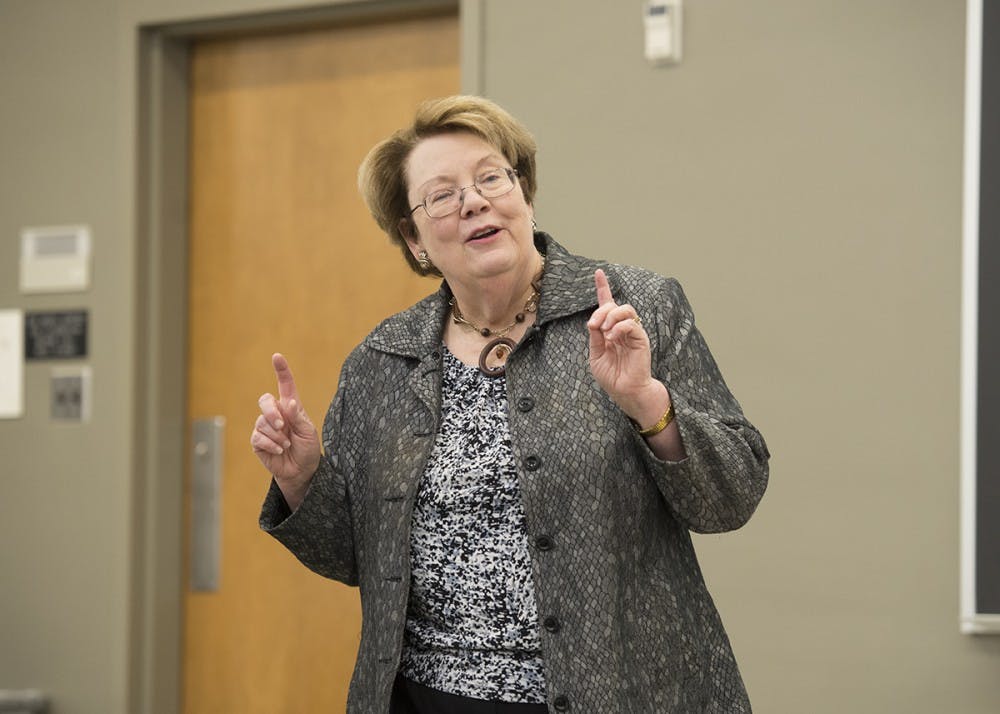University President Teresa Sullivan attended Student Council’s weekly meeting Tuesday to discuss President Donald Trump’s recent executive order on immigration as it pertains to the University community. She also updated the members on news from the state legislature, including a bill that would reduce the funding available for financial aid.
“I thought I’d organize this into talking about federal, state and local issues,” Sullivan said to open her remarks.
She began with the federal level, explaining the University’s response to Trump’s executive order blocking immigration from seven majority-Muslim countries. She emphasized the University’s concern for its students and faculty, saying the University’s immediate response was to ensure their safety.
“The first thing we did was reach out to the University community,” Sullivan said.
The University has advised students from the affected countries to avoid traveling abroad until more details about the executive order are sorted out.
“We just can’t guarantee they’d be able to get back,” she explained.
However, Sullivan reiterated the University’s stance on sharing students’ private information, including immigration or citizenship status. She said no student’s information will be shared unless the University is legally required to release it.
“We’re really quite serious about protecting the privacy of our students,” Sullivan said. “We protect the privacy of all our students, up to the point that someone shows up with a court order.”
Austin Gogal, a third-year College student and Student Council representative, asked Sullivan if any students or faculty are currently abroad and affected by the order.
“We believe that we’ve got everybody back,” Sullivan replied, though she added the University is still working to confirm this.
Brett Curtis, a third-year Curry student and chair of the representative body, asked Sullivan if she or the University would be taking a public stance on Trump’s executive order.
Sullivan explained it was unlikely the University would be taking a stance in favor of or against the order, for a variety of reasons. She said it would likely be ineffective, as many universities are written off as liberal institutions.
She also emphasized the importance of students — rather than large institutions — reaching out to lawmakers.
“When they hear from constituents, they pay attention,” Sullivan said.
Sullivan then moved on to discuss state level issues, specifically House Bill 1410, which would prevent Virginia’s public colleges from using in-state students’ tuition to fund financial aid. The bill would also prohibit schools from using more than five percent of out-of-state students’ tuition for financial aid for other out-of-state students.
Sullivan said several community members had reached out to the University with concerns about the bill, since it would post a great challenge to the University’s AccessUVA financial aid program.
Sullivan reassured council members that the University is following the bill — along with others that could affect the University — very closely.
She specifically said HB1410 is a cause for concern.
“This is one, I’ll tell you candidly, that we are worried about,” Sullivan said, emphasizing the negative impact it would have on the University’s financial aid. “I’m worried about it for U.Va, but I’m also worried about it for a lot of other schools.”
Sullivan said the second clause of HB 1410, which would prohibit public universities from using more than five percent of the revenue from out-of-state students’ tuition towards out-of-state students’ financial aid, would effectively end AccessUVA.
“[That clause] ruins AccessUVA, that just pulls the rug out from under it,” Sullivan said. “My hope is that in the long run we’re going to be able to endow AccessUVA … but we’re a long way from getting there. Right now we have to use tuition money to help meet some of the promises we’ve made under AccessUVA.”
She said state senators who support the bill believe it’s unfair to charge different tuitions for people of different incomes, though Sullivan disagreed with that view.
“I believe this bill is shortsighted,” she said.
Sullivan went on to talk about more local issues as well, including the search committee that will be tasked with finding her replacement before her contract expires in 2018. She reassured the council members the committee will take student opinion into account, and mentioned the committee that chose her after her predecessor’s stepped down also included some student members.
“I have certainly encouraged them to seek some student input,” she said.
Sullivan also announced to the council an upcoming enrollment increase of 100 students. The Board of Visitors approved the increase in January.
While acknowledging the unpopularity of this decision among students, Sullivan said only half of the increase would be in the form of traditional first-year students living in dorms.
The other half, she said, would be transfer students, adults pursuing professional degrees and even some online students.
“Many of those students never come to Grounds, except for the day they walk the Lawn for Final Exercises,” Sullivan said.
In another attempt to prevent any overcrowding, Sullivan said many of the new students will be attending the Architecture and Engineering schools, which have more space to accommodate newcomers.
“It minimizes the effect on the College, where the crowding has been the greatest,” Sullivan explained.
Student Council passed a resolution in opposition to HB 1410. They also passed a resolution in support of continuing Election Day shuttle services in future years.







